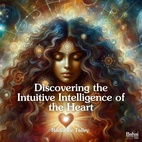The views expressed in our content reflect individual perspectives and do not represent the official views of the Baha'i Faith.
 [Editor’s Note: This is the third installment of a six-part essay. Click here to read from the beginning.]
[Editor’s Note: This is the third installment of a six-part essay. Click here to read from the beginning.]
If you believe that God exists, the next split on the decision tree leads to whether you believe God is either “personal,” or a creative but blind force. Most religions agree on a personal God, for quite a logical reason:
If God exists, then by definition He must be vastly superior to anything in His creation. Since we are a part of that creation, and we know a thing or two about ourselves, we can assume that God must contain all the capacities of the human (plus infinitely more). Therefore, if one human capacity is the ability to love, then God must have that ability, and more. If one human capacity is to discern and value justice, then God must know and value justice. If another human capacity is compassion, then God must also contain that, and so forth. Carried to its logical conclusion, if one capacity of humans is to discipline their children out of love, then God too must have this capacity and to an even greater degree. Carefully applied, this line of logic gives motive and rich texture to humanity’s ongoing relationship with our Creator:
All material organisms are captives of nature. None of them can deviate in the slightest from the law of nature. This earth, these great mountains, the animals with their wonderful powers and instincts cannot go beyond natural limitations. All things are captives of nature except man. …the spirit of man differentiates and distinguishes him above all the lower kingdoms. It is this spirit to which the verse in the Old Testament refers when it states that man has been created “after the image and likeness of God”. The spirit of man alone penetrates the realities of God and partakes of the divine bounties. – Abdu’l-Baha, Foundations of World Unity, p. 90.
The belief in a “personal God” does not anthropomorphize God: “humans do X so God must do X because we’re obviously very close to gods.” Rather, believing in a personal God has a simple logic: any being contains the capacities of any lower being. Vegetables have the capacity of minerals, yet more. Animals have the capacities of vegetables, yet more. Humans have the capacities of animals, yet more. And so forth.
 Another frequent corollary to this distinction of God as “personal” is that God can and does intervene in human affairs. This belief serves as the basis for prayers of supplication. For me, God by definition has two qualities: omnipotence and will. By definition, God does what He wants. That’s what it means to be God. And if He does what He wants, it stands to reason He would want to interact with His creation in all sorts of ways, just as a loving parent wants to interact with her child.
Another frequent corollary to this distinction of God as “personal” is that God can and does intervene in human affairs. This belief serves as the basis for prayers of supplication. For me, God by definition has two qualities: omnipotence and will. By definition, God does what He wants. That’s what it means to be God. And if He does what He wants, it stands to reason He would want to interact with His creation in all sorts of ways, just as a loving parent wants to interact with her child.
And just as a loving parent teaches her child to use its words and ask for what it wants as opposed to demanding, complaining, having a tantrum or merely suffering, it seems God has encouraged us similarly to use words and thoughts to ask for what we want and need — a crucial link in the developmental process for any individual or sentient species.
Read the next article in the series: How Would a “Personal God” Interact With Us?
Read the previous article in the series: Why Baha’i? Question #1: Is There a God?

















Comments
Sign in or create an account
Continue with Facebookor